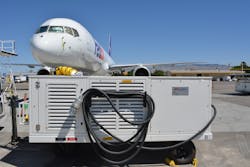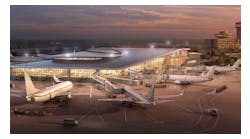Boise Airport Continues Efforts to Provide an Environmentally Friendly Facility
Continuing the city of Boise vision to make Boise the most livable city in the country, the Boise Airport has completed a project that will make them a more environmentally sustainable facility. Recently, the Boise Airport received Federal Aviation Administration (FAA) funding from a Voluntary Airport Low Emissions (VALE) grant which funds projects that reduce fossil fuel emissions in EPA designated areas.
The VALE grant provided funding for two ground power/pre-conditioned air units. These units are electrically powered and replace four diesel-powered units that had been in use previously. In addition, three diesel-powered mobile light units were replaced by three new electrically powered LED lights.
The ground power and pre-conditioned air units provide the aircraft with power, heat, and air conditioning while on the aircraft parking apron. This allows the aircraft to completely power off – reducing fuel consumption and emissions due to long idle periods. The emission reduction is equivalent to removing 2.5 cars off the road each year.
“This project is just one example of how the airport is focused on sustainability,” said Boise Airport Director, Rebecca Hupp. “In the past few years the airport, along with its partners, have invested in a number of other environmentally sustainable projects including; electric car charging stations in our parking garage, low water landscape improvements, and energy efficient appliances in new concessions.”
“Not only are these additions intended to reduce emissions but are also essential in improving the lighting and safety of the apron as well as reducing ground clutter around the aircraft,” said T-O Engineers Project Manager, Nathan Cuvala. “This project has allowed the airport to move towards a more environmentally sustainable facility, and we are grateful to have had a hand in this progress.”
Local firms, T-O Engineers and CSHQA, provided design and construction administration services while the national firm Leigh Fisher helped secure the $660,000 FAA VALE grant used to fund the project.



